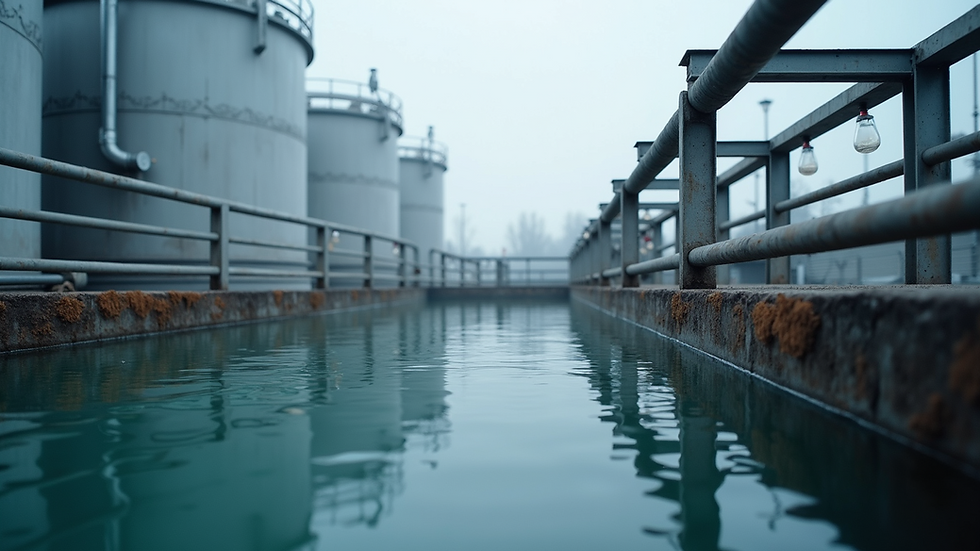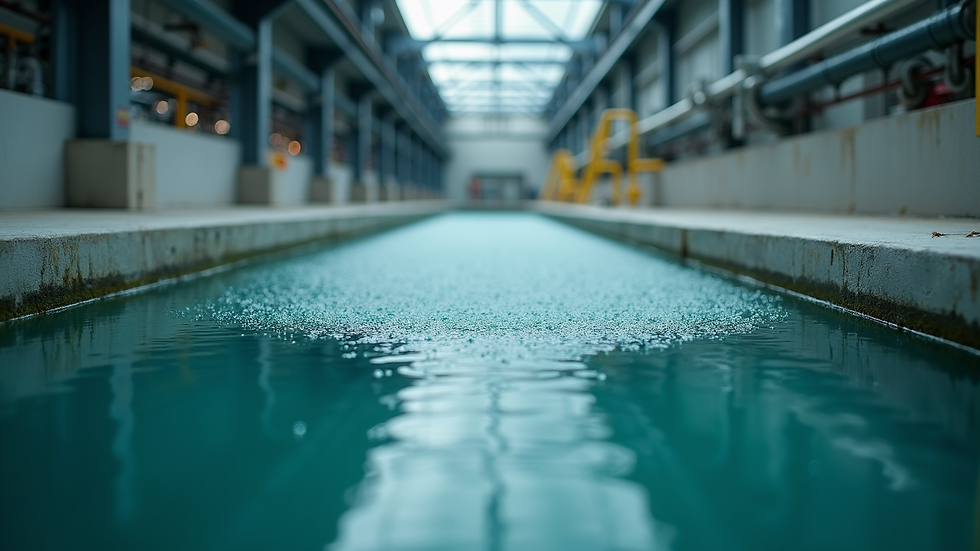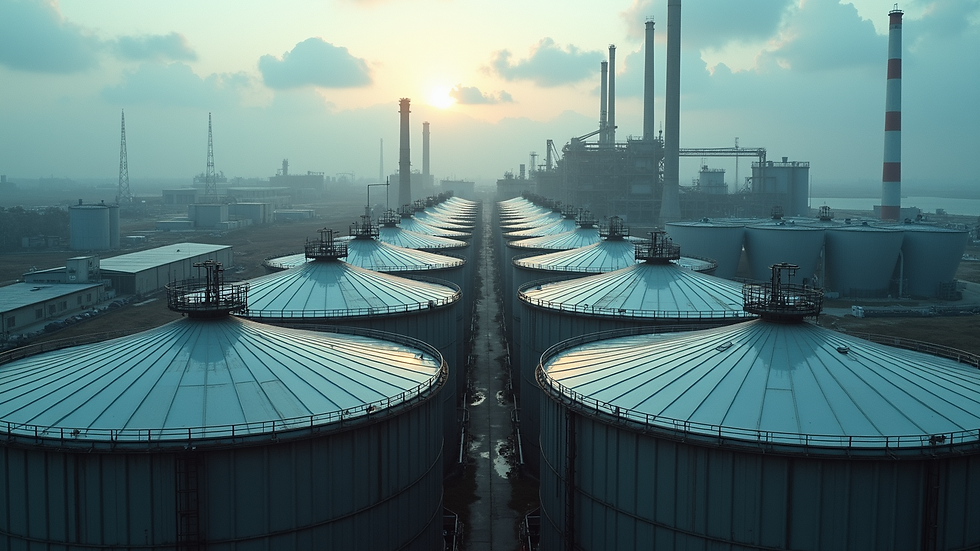Understanding Industrial Wastewater Treatment in India
- palwinder kaur
- Sep 26, 2025
- 4 min read
Industrial growth in India has been rapid and significant over the past few decades. However, this growth has brought with it environmental challenges, particularly in managing the waste generated by industries. One of the most critical concerns is the treatment of wastewater produced during industrial processes. Proper treatment of this wastewater is essential to protect water bodies, maintain public health, and comply with environmental regulations.
The Importance of Industrial Wastewater Treatment in India
India's industrial sector produces a vast amount of wastewater daily. This wastewater often contains harmful chemicals, heavy metals, and organic pollutants that can severely impact the environment if discharged untreated. Industrial wastewater treatment is the process of removing contaminants from this water before it is released back into the environment or reused.
The importance of treating industrial wastewater in India cannot be overstated. Untreated wastewater can pollute rivers, lakes, and groundwater, affecting aquatic life and human health. Moreover, with increasing water scarcity in many parts of India, treated wastewater can be a valuable resource for irrigation, industrial reuse, and even groundwater recharge.
Key Benefits of Industrial Wastewater Treatment
Environmental Protection: Prevents pollution of natural water bodies.
Health Safety: Reduces risks of waterborne diseases.
Regulatory Compliance: Helps industries meet legal standards.
Resource Conservation: Enables water reuse and reduces freshwater demand.
Economic Advantages: Minimizes penalties and improves corporate image.

Industrial Wastewater Treatment Processes
Industrial wastewater treatment involves several stages, each designed to remove specific types of pollutants. The choice of treatment methods depends on the nature of the wastewater and the level of purification required.
Primary Treatment
This is the initial stage where large solids and suspended particles are removed through screening and sedimentation. It helps reduce the load on subsequent treatment processes.
Secondary Treatment
This stage focuses on the biological degradation of organic matter. Microorganisms break down pollutants in aeration tanks or biofilters. Common methods include activated sludge processes and trickling filters.
Tertiary Treatment
Tertiary treatment is an advanced process that removes remaining contaminants such as nutrients, heavy metals, and pathogens. Techniques include filtration, chemical precipitation, and disinfection using chlorine or UV light.
Sludge Treatment and Disposal
The solid waste or sludge generated during treatment is further processed to reduce volume and toxicity. It can be dewatered, composted, or incinerated depending on its composition.
Emerging Technologies
India is also adopting innovative technologies like membrane filtration, advanced oxidation processes, and zero liquid discharge systems to enhance treatment efficiency and sustainability.

What is industrial waste and its example?
Industrial waste refers to the by-products generated from manufacturing and industrial activities. These wastes can be solid, liquid, or gaseous and often contain hazardous substances that require careful handling and disposal.
Examples of Industrial Waste
Chemical Waste: Acids, alkalis, solvents, and heavy metals from chemical manufacturing.
Textile Waste: Dyes, chemicals, and fibers from textile processing.
Pharmaceutical Waste: Expired drugs and chemical residues.
Metal Waste: Slags, dust, and metal shavings from metal processing.
Food Processing Waste: Organic matter, oils, and fats.
Paper and Pulp Waste: Lignin, chemicals, and fibers.
Proper management of these wastes, especially liquid waste, is crucial to prevent environmental contamination. Industrial wastewater treatment plays a vital role in treating liquid industrial waste before disposal or reuse.

Challenges in Industrial Wastewater Treatment in India
Despite the clear benefits, several challenges hinder effective industrial wastewater treatment in India:
Lack of Awareness: Many small and medium enterprises are unaware of treatment technologies and regulations.
High Costs: Installation and operation of treatment plants can be expensive.
Inadequate Infrastructure: Many industrial areas lack centralized treatment facilities.
Regulatory Enforcement: Weak monitoring and enforcement lead to non-compliance.
Technological Gaps: Outdated or inappropriate technologies reduce treatment efficiency.
Water Scarcity: Limited water availability increases the need for recycling but also complicates treatment.
Addressing these challenges requires coordinated efforts from government bodies, industries, and technology providers.
Best Practices for Effective Industrial Wastewater Treatment
Industries in India can adopt several best practices to improve wastewater management:
Source Reduction: Minimize waste generation by optimizing processes and using cleaner technologies.
Segregation of Wastewater: Separate hazardous and non-hazardous streams for targeted treatment.
Regular Monitoring: Conduct frequent testing to ensure compliance and identify issues early.
Use of Advanced Technologies: Invest in modern treatment methods like membrane bioreactors and zero liquid discharge.
Employee Training: Educate staff on environmental practices and operational procedures.
Collaboration: Partner with specialized treatment companies and government agencies.
Reuse and Recycling: Implement systems to reuse treated water within the plant or for other purposes.
By following these practices, industries can reduce their environmental footprint and contribute to sustainable development.
The Role of Government and Regulations
The Indian government has established several regulations and guidelines to control industrial pollution. The Water (Prevention and Control of Pollution) Act, 1974, and the Environment Protection Act, 1986, mandate industries to treat their wastewater before discharge.
State Pollution Control Boards (SPCBs) monitor compliance and issue permits. The government also promotes incentives for adopting cleaner technologies and supports research in wastewater treatment.
Strict enforcement and awareness campaigns are essential to ensure industries adhere to these regulations and protect India's water resources.
Future Outlook for Industrial Wastewater Treatment in India
With increasing environmental concerns and water scarcity, the future of industrial wastewater treatment in India looks promising. The adoption of sustainable practices and advanced technologies is expected to grow.
Emerging trends include:
Digital Monitoring: Use of IoT and AI for real-time wastewater quality monitoring.
Decentralized Treatment: Small-scale plants for remote or small industries.
Circular Economy: Integrating wastewater treatment with resource recovery like biogas and nutrient extraction.
Public-Private Partnerships: Collaborative projects to build infrastructure and share expertise.
Industries that invest in efficient wastewater treatment will not only comply with regulations but also gain competitive advantages through cost savings and improved reputation.
For more detailed information on industrial wastewater treatment solutions, visit Liecl Water.
This comprehensive understanding of industrial wastewater treatment in India highlights the critical need for effective management practices. By embracing technology, adhering to regulations, and fostering awareness, industries can play a pivotal role in safeguarding the environment and promoting sustainable growth.



Comments